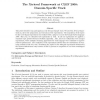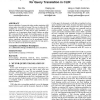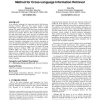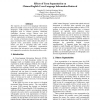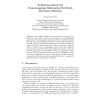TREC
2001
14 years 8 months ago
2001
Ten groups participated in the TREC-2001 cross-language information retrieval track, which focussed on retrieving Arabic language documents based on 25 queries that were originall...
LREC
2008
14 years 8 months ago
2008
In this paper we present a Japanese-English Bilingual lexicon of technical terms. The lexicon was derived from the first and second NTCIR evaluation collections for research into ...
CLEF
2008
Springer
14 years 9 months ago
2008
Springer
This article describes our participation at the Domain-Specific track. We used the Xtrieval framework [2], [3] for the preparation and execution of the experiments. The translatio...
CIKM
2008
Springer
14 years 9 months ago
2008
Springer
Recent availability of commercial online machine translation (MT) systems makes it possible for layman Web users to utilize the MT capability for cross-language information retrie...
CIKM
2008
Springer
14 years 9 months ago
2008
Springer
As an effective technique for improving retrieval effectiveness, relevance feedback (RF) has been widely studied in both monolingual and cross-language information retrieval (CLIR...
ESSIR
2000
14 years 11 months ago
2000
This workshop attempted to present the state-of-the-art in multilingual information access (MLIA) research and development, including cross-language information retrieval and ques...
SPIRE
1999
Springer
14 years 11 months ago
1999
Springer
The majority of recent Cross-Language Information Retrieval (CLIR) research has focused on European languages. CLIR problems that involve East Asian languages such as Chinese intr...
CLEF
2000
Springer
14 years 11 months ago
2000
Springer
The application of nlp techniques to improve the results of information retrieval is still considered as a controversial issue, whereas nlp techniques in cross-language informatio...
CLEF
2000
Springer
14 years 11 months ago
2000
Springer
Abstract. The problem of nding documents that are written in a language that the searcher cannot read is perhaps the most challenging application of Cross-Language Information Retr...
CIKM
2001
Springer
14 years 12 months ago
2001
Springer
In Cross-Language Information Retrieval (CLIR), queries in one language retrieve relevant documents in other languages. Machine-Readable Dictionary (MRD) and Machine Translation (...

